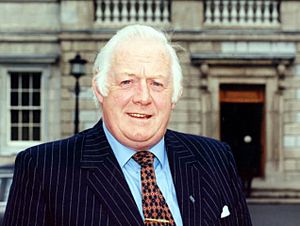Brendan McGahon facts for kids
Quick facts for kids
Brendan McGahon
|
|
|---|---|
 |
|
| Teachta Dála | |
| In office November 1982 – May 2002 |
|
| Constituency | Louth |
| Personal details | |
| Born | 22 November 1936 Dundalk, County Louth, Ireland |
| Died | 8 February 2017 (aged 80) Ravensdale, County Louth, Ireland |
| Political party | Fine Gael |
| Spouses | Celine Lundy (m. 1970; d. 2011) |
| Relatives | John McGahon (nephew) |
Brendan McGahon (born 22 November 1936 – died 8 February 2017) was an Irish politician. He was a member of the Fine Gael political party. He served as a Teachta Dála (TD) for the Louth area. A TD is like a Member of Parliament in other countries. He held this important role from 1982 to 2002.
Brendan McGahon was known for being a very direct and honest speaker. He was first elected to Dáil Éireann, the Irish parliament, in November 1982. He kept his seat in every election until he retired in 2002.
Contents
Early Life and Family History
Brendan McGahon was born in Dundalk, which is in County Louth, Ireland. He went to school at St. Mary's College in Dundalk. His family had a long history in local politics and business.
His grandfather, T.F. McGahon, was one of the first members of the Dundalk Urban District Council. This council was created in 1898 to help run local affairs. T.F. McGahon was a key member of the Irish Parliamentary Party. He also started a local newspaper called the Dundalk Democrat. This newspaper supported his political party.
T.F. McGahon was not in favour of the Irish War of Independence. He believed it would lead to the partition of Ireland, which meant dividing the island. His son, O.B. McGahon, and then his nephew, Hugh McGahon, later followed him onto the council. The family eventually joined the Fine Gael party. They were also important members of the Ancient Order of Hibernians, a friendly society.
Brendan McGahon married Celine Lundy, who was from Newry. In the 1960s, he took over the family's newspaper business. He also played soccer for Dundalk F.C. in the top division for several years.
Brendan McGahon's Political Journey
Brendan McGahon followed his cousin Hugh into local politics. He became a member of Dundalk Town Council and Louth County Council in 1979. He tried to get elected to Dáil Éireann in 1981 and February 1982 but was not successful.
However, in November 1982, he won his seat for Louth. He defeated another Fine Gael TD, Bernard Markey. After that, he was re-elected five more times in general elections.
Standing Up for What He Believed In
A very important part of his political life was his strong stance against violence. He showed great courage during a very difficult time in Ireland. In 1981, he bravely refused to close his newsagent shop in Dundalk. This was during the funerals of people who had died in a hunger strike.
A few years later, he took another big risk. He gave evidence in the High Court. This was to support a newspaper, the Sunday Times, which was being sued. Local police were told not to get involved in the case. But Brendan McGahon was not afraid to speak up. His evidence helped the newspaper defend itself.
He was known as a very direct and honest TD. He often spoke his mind on many different topics. He also spoke out against the influence of alcohol. He even voted against his own party's wishes on some issues. For example, he voted with his friend Tony Gregory to ban hare-coursing, which is a sport involving dogs chasing hares.
Despite having very different opinions from some other politicians, he was on good terms with them. This included people like Michael D. Higgins and David Norris.
Brendan McGahon decided not to run in the 2002 general election. He then retired from politics.
Family Life and Legacy
Brendan McGahon lived in Ravensdale, County Louth. His family continued to be involved in politics. His son, Conor, was a Louth County Councillor from 1991 to 1999. His brother, Johnny, was also a Louth County Councillor from 1995 to 2004.
Johnny's son, John McGahon, was elected to Louth County Council in 2014. He was then elected to Seanad Éireann, the upper house of the Irish parliament, in 2020. This shows the family's lasting connection to public service.
 | Delilah Pierce |
 | Gordon Parks |
 | Augusta Savage |
 | Charles Ethan Porter |

